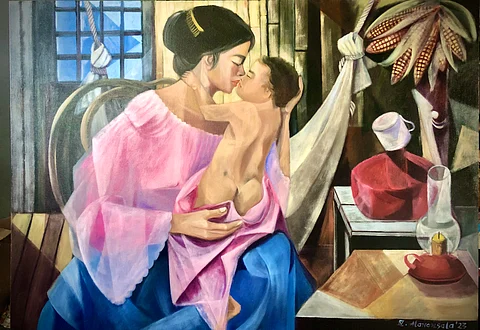
- NEWS
- the EDIT
- COMMENTARY
- BUSINESS
- LIFE
- SHOW
- ACTION
- GLOBAL GOALS
- SNAPS
- DYARYO TIRADA
- MORE

National Artist Vicente Silva Manansala would be 114 years old yesterday, 22 January, if he were still alive today. He was born in 1910 and died in 1981 at the age of 71. However, it appears that not so long ago, in the middle of the last century, the name Manansala was synonymous with Philippine modernism.
Many consider him to be the colossus of the Philippine art scene. Fernando Amorsolo, the first to be declared National Artist, was safely ensconced in history as the exemplar of conservatism, and while National Artist Victorio Edades pioneered the concept of modernism in
The country, it was Vicente Manansala — by his superlative draftsmanship and innovative visual expression through his indigenized interpretation of Cubism now labeled “Transparent Cubism” — who gained a stronger, more solid foothold in the idiom that capture the spirit of the age.
Khristina Manansala, Manansala’s granddaughter, is presenting her latest works in an exhibition Gunita: Remembering Manansala at The Artologist Gallery to commemorate the 114th anniversary of his birth. To join her, she has invited a quartet of artists: Rafael Cusi, Nemi Miranda, Pancho Piano and Cid Reyes. Collectively, these artists honor the artistic legacy of the maestro of Modernism.
Manansala was born in Macabebe, Pampanga, and spent his childhood in Intramuros, Manila, where he copied the estampita image of the Holy Family and, as he once admitted, drew the many cockroaches scuttling inside their makeshift house within the Wall. He earned a Fine Arts degree from the University of the Philippines. He continued his studies at the Ecole des Beaux-Arts in Montreal, France, and the University of Paris with a UNESCO scholarship grant and a French government scholarship, respectively. Fernand Leger, the French master whose Cubist works featured tubular, conical, cubed and machine-like, streamlined forms, mentored him for a significant portion of his studies.
When Manansala returned to his home country in the early 1950s, he struggled to make a living from his paintings. In his first one-man show, held at the Manila Hotel, he failed to sell a single piece. Forlorn and defeated, he revealed that he walked home on foot from the Manila Hotel to his home in Reina Regente, a district in Santa Cruz, Manila. The young, embittered Manansala promised himself that one day, collectors would line up to buy his paintings.
Indeed, this wishful dream came true. There was a time when wealthy collectors would travel from Manila to Manansala’s home in Binangonan, where the client would inscribe his name on the back of an empty canvas while waiting for the master’s hands to create his masterpiece. A group of ardent admirers and collectors was formed under the name “Friends of Manansala.”
Manansala’s early works recognized the abject social reality of the deprived and underprivileged, as exemplified by the now-iconic Madonna of the Slums. Manansala’s expressive brushstrokes elevated ordinary and familiar sights such as the jeepneys that crowd the city streets or the baroque altar of a dimly-lit church to a transcendent scene brimming with Pinoy vitality and folk religiosity. Manansala’s Pila sa Bigas, a depressing image of slum dwellers waiting for their rice ration, is also a classic, serving as a damning indictment of social injustice and poverty in the Philippines.
The master, known for his “Transparent Cubism,” used the interpenetration of layers of light and planes, in contrast to Picasso’s and Braque’s multidimensional viewpoints. Furthermore, in his depiction of the human figure, he fragmented his shapes without becoming abstract. The versatility of his technique was best demonstrated in the depiction of his favorite subjects, the sabungeros or cockfighting enthusiasts and the candle vendors.
Manansala’s still life paintings of fruits, fish and vegetables exude a Zen quality, fostering deep contemplation. He could perfect the tones and subtleties of Transparent Cubism. This is demonstrated by his Whir series, which depicts a flight of birds, as well as his reworkings of the paintings of Dutch masters Vermeer and De Hooch.
Vicente Manansala’s legacy lives on in the works of younger Filipino artists who are inspired by his work. The show, created by Khristina Manansala, is a loving tribute to the Filipino master whose creative genes live on in his granddaughter’s veins.
Gunita: Remembering Manansala is on 30 January at the Artologist Gallery, Art Plaza, Level 4, Shangri-La Plaza Main Wing, EDSA, Mandaluyong City, and from 31 January to 9 February at the Artologist Gallery pop-up store at Level 3 of Shangri-La Plaza Shangri-La Plaza Main Wing.
